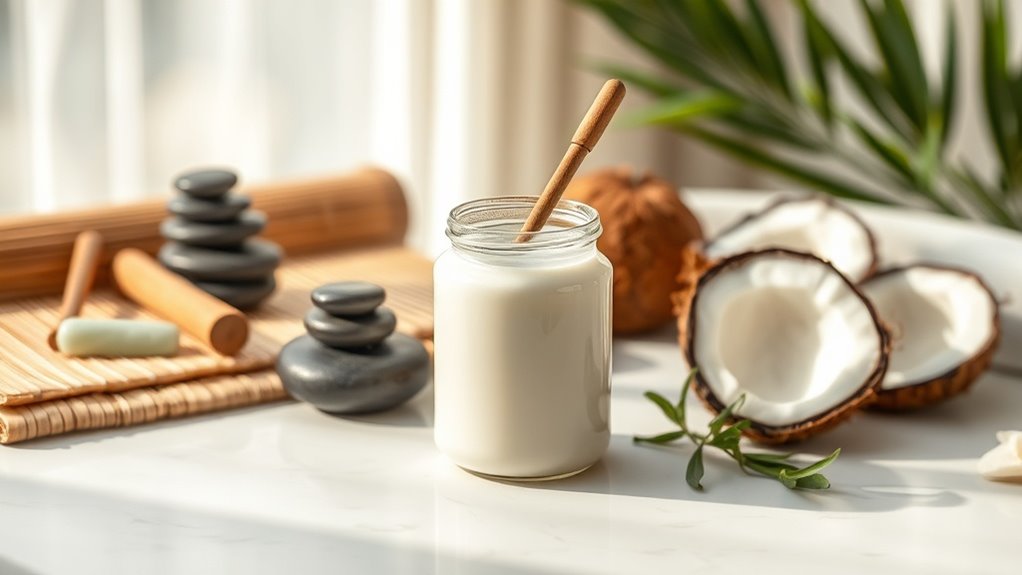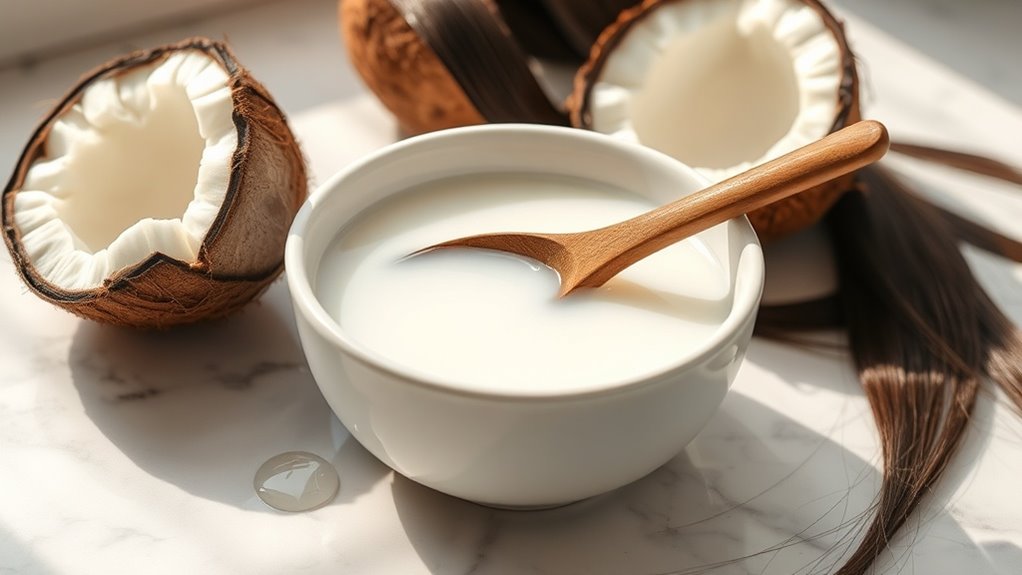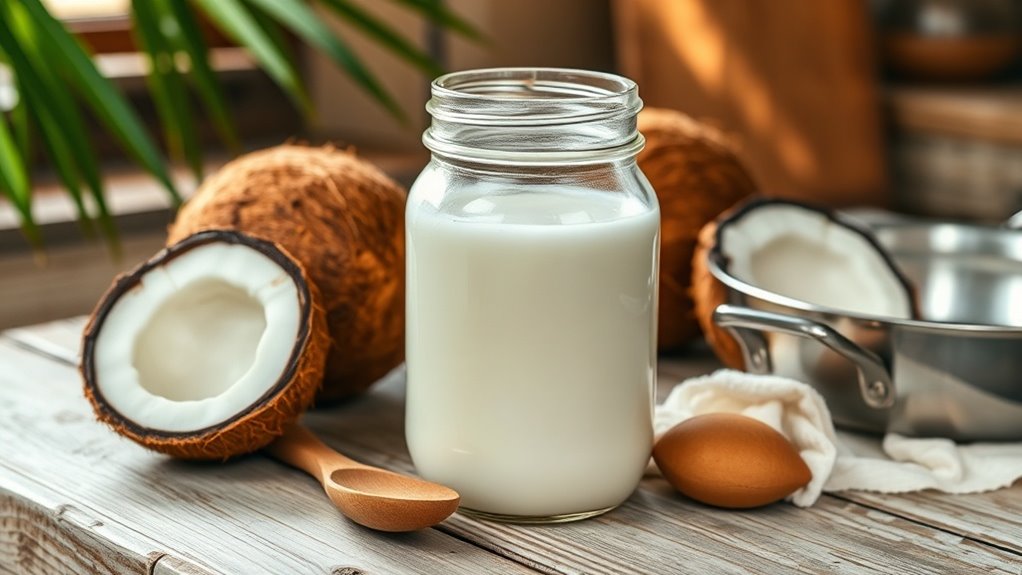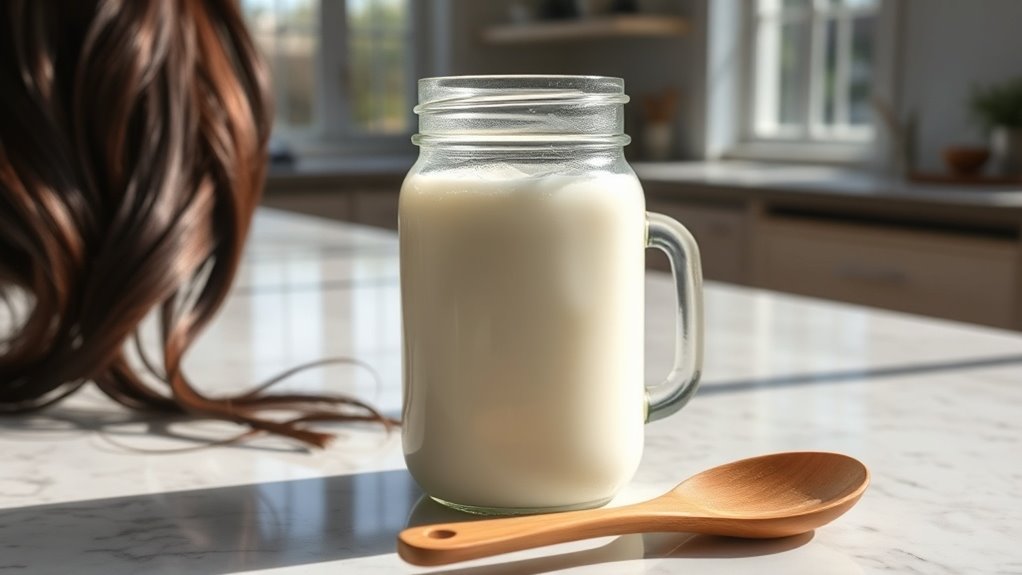Coconut oil’s unique molecular structure makes it your hair’s best friend. It penetrates deep into hair shafts to prevent protein loss, strengthen strands, and nourish your scalp with essential fatty acids. You’ll love how it reduces dandruff, controls frizz, and promotes healthy growth while protecting color-treated hair. Apply warm oil from roots to tips, focusing on damaged areas, and wrap with a warm towel for best results. There’s so much more to discover about this natural hair care miracle.
Key Takeaways
-
Coconut oil deeply penetrates hair shafts to strengthen strands from within and prevent protein loss during washing.
-
Regular application reduces dandruff and promotes healthy hair growth through essential fatty acids and vitamins.
-
Apply warm coconut oil from roots to tips, focusing on damaged areas, and leave overnight for maximum benefits.
-
Perfect for all hair types, especially effective on chemically treated, damaged, or frizzy hair.
-
Maintains healthy scalp with natural antibacterial properties while creating a protective barrier against daily damage.
Why Coconut Oil Is the Ultimate Hair Care Secret
While many trendy hair products come and go, coconut oil has remained a trusted beauty secret for centuries. You’ll join countless others who’ve discovered its remarkable ability to penetrate hair shafts deeply, preventing protein loss and strengthening strands from within.
Unlike synthetic products, coconut oil’s natural molecular structure allows it to work its magic at the cellular level.
You can easily become part of this time-tested tradition by creating your own coconut oil hair mask at home. The oil’s rich fatty acids and vitamins nourish your scalp, reduce dandruff, and promote healthy hair growth.
When you incorporate this natural wonder into your hair care routine, you’re not just following a trend – you’re embracing an ancient wisdom that’s proven effective across generations.
The Science Behind Coconut Oil’s Hair Benefits
The remarkable effectiveness of coconut oil isn’t just folklore – it’s backed by solid scientific research. Your hair’s structure naturally attracts coconut oil’s medium-chain fatty acids, allowing deep penetration into the hair shaft. This unique molecular structure prevents protein loss and strengthens your strands from within.
| Benefits | Scientific Explanation |
|---|---|
| Moisture Retention | Lauric acid bonds with hair proteins |
| Damage Prevention | Creates protective barrier against hygral fatigue |
| Protein Loss Prevention | Reduces protein loss during washing cycles |
You’ll find that coconut oil’s natural antibacterial and antifungal properties also help maintain a healthy scalp environment. When you apply it regularly, the oil’s high concentration of vitamins and essential fatty acids work to repair damaged cuticles and restore your hair’s natural shine.
Essential Nutrients in Coconut Oil for Hair Growth
Packed with essential compounds, coconut oil contains an impressive array of nutrients that stimulate hair growth and nourishment.
You’ll find medium-chain fatty acids, particularly lauric acid, which penetrate the hair shaft and protect your strands from protein loss. The oil’s rich vitamin E content acts as a powerful antioxidant, shielding your hair from damaging free radicals.
When you use coconut oil, you’re also treating your hair to vitamin K and iron, which help strengthen your follicles and promote healthy growth.
The presence of antimicrobial properties helps maintain a clean, healthy scalp – a vital factor for ideal hair growth.
Plus, you’ll benefit from essential minerals like selenium and zinc, which work together to support your hair’s natural growth cycle and maintain its strength.
How Coconut Oil Prevents Hair Damage
Because coconut oil forms a protective barrier around hair strands, it effectively shields your locks from various forms of damage. You’ll love how this natural protector works tirelessly to keep your hair strong and resilient against daily wear and tear.
| Damage Type | How Coconut Oil Helps |
|---|---|
| UV Rays | Creates a natural sunscreen barrier |
| Heat Styling | Reduces protein loss from heat exposure |
| Chemical Processing | Prevents protein leaching during treatments |
| Environmental Stress | Seals cuticles against pollution |
When you apply coconut oil regularly, you’re joining countless others who’ve discovered its defensive powers. The oil penetrates deep into your hair shaft, reducing protein loss and preventing the dreaded split ends that come from mechanical damage. Your hair stays protected whether you’re hitting the beach or styling for a night out.
Best Types of Coconut Oil for Hair Care
Selecting high-quality coconut oil makes a significant difference in your hair care routine. You’ll want to choose virgin or extra-virgin coconut oil, as these undergo minimal processing and retain their natural nutrients.
Look for organic options that are cold-pressed and unrefined to guarantee you’re getting the purest form.
When shopping, you’ll notice several varieties available. While refined coconut oil works fine, it’s processed with chemicals and heat that reduce its beneficial properties.
If you’re keen on maximizing results, stick with virgin coconut oil in glass containers, which better preserve the oil’s integrity. The oil should be clear when liquid and pure white when solid.
Your best options will come from reputable brands that specialize in natural and organic products.
Pre-Shampoo Coconut Oil Treatment Guide
Three key steps make a pre-shampoo coconut oil treatment highly effective for your hair care routine.
First, warm 2-3 tablespoons of coconut oil between your palms until it’s completely melted.
Next, section your hair and apply the oil from roots to tips, giving extra attention to damaged areas. You’ll want to massage it gently into your scalp for about 3-5 minutes.
Let the oil penetrate your strands for at least 30 minutes, though many beauty enthusiasts prefer overnight treatment for maximum benefits.
For best results, wrap your hair in a warm towel or shower cap while you wait.
When you’re ready to wash, apply shampoo directly to your oiled hair before adding water – this helps remove the oil more effectively.
Overnight Coconut Oil Hair Mask Recipe
While regular coconut oil treatments can benefit your hair, an overnight mask offers deeper nourishment and repair. This DIY treatment will leave your locks feeling silky smooth and intensely moisturized.
Start with 2-3 tablespoons of pure, organic coconut oil and warm it between your palms.
Section your dry hair into manageable parts and apply the oil from roots to tips, focusing extra attention on damaged areas. Once you’ve coated all your hair, gently massage your scalp for 3-5 minutes to stimulate blood flow.
Wrap your hair in a silk scarf or wear a shower cap to protect your pillowcase. Leave the mask on for 6-8 hours while you sleep.
In the morning, shampoo twice to remove all residue, then condition as usual.
Mixing Coconut Oil With Other Natural Ingredients
You can enhance coconut oil’s natural hair-nourishing properties by combining it with other beneficial ingredients from your kitchen.
Mix in avocado for extra moisture, honey for shine, or aloe vera for scalp health. Try blending one tablespoon of coconut oil with an egg yolk to create a protein-rich treatment that strengthens your strands.
For an intensive repair mask, combine equal parts coconut oil and plain yogurt, then add a few drops of lavender essential oil.
If you’re dealing with dandruff, mix coconut oil with tea tree oil and lemon juice.
Those with dry, frizzy hair will love the combination of coconut oil and shea butter, while adding apple cider vinegar helps balance your scalp’s pH levels and adds shine to dull locks.
Proper Application Techniques for Maximum Results
To get the most out of your coconut oil treatment, proper application technique makes all the difference. Start with dry or slightly damp hair, and section it into manageable parts.
Warm the oil between your palms until it’s completely liquid, then massage it gently from roots to tips, focusing on damaged areas.
For best results, you’ll want to start at your scalp using circular motions with your fingertips. Work your way down, ensuring even distribution throughout your strands.
Don’t forget those often-neglected areas behind your ears and at the nape of your neck. Once you’ve covered all sections, gather your hair into a loose bun and wrap it in a warm towel or shower cap.
This helps the oil penetrate deeply into your hair shaft, maximizing its nourishing benefits.
Common Mistakes to Avoid When Using Coconut Oil
Despite coconut oil’s many benefits, several common mistakes can reduce its effectiveness or even damage your hair. One major error is using too much oil, which can leave your hair greasy and weigh it down.
You’ll also want to avoid applying cold coconut oil straight from the jar – always warm it between your palms first for better absorption.
Don’t make the mistake of leaving the oil in your hair for too long, as this can lead to protein buildup and brittleness.
Skipping the double-cleanse when washing it out is another error that’ll leave residue behind.
Finally, you’re missing out if you’re applying coconut oil to wet hair – it won’t penetrate as effectively as it does on dry strands.
Hair Types That Benefit Most From Coconut Oil
Three main hair types respond exceptionally well to coconut oil treatments: fine to medium hair with low porosity, chemically processed hair, and naturally dry or damaged strands.
You’ll find coconut oil particularly beneficial if your hair falls into these categories:
| Hair Type | Benefits |
|---|---|
| Fine/Medium | Prevents protein loss, adds shine |
| Chemically Treated | Restores moisture, reduces breakage |
| Color-Treated | Protects dye, extends color life |
| Damaged/Split Ends | Reduces protein loss, smooths cuticles |
| Dry/Frizzy | Controls frizz, adds moisture |
If you’ve got high porosity or very coarse hair, you’ll want to use coconut oil sparingly or mix it with other oils. For ideal results, always apply coconut oil to damp hair and focus on the mid-lengths to ends, where your strands need the most nourishment.
Weekly Hair Care Routine With Coconut Oil
Now that you understand which hair types work best with coconut oil, establishing a consistent weekly routine will maximize its benefits.
Start by applying warm coconut oil to your scalp and hair the night before your usual wash day. Gently massage it in and leave it overnight for deep penetration.
On wash day, shampoo thoroughly to remove all oil residue. You’ll want to use coconut oil as a leave-in treatment twice during the week – just apply a small amount to your hair’s mid-lengths and ends.
For extra protection, rub a tiny drop between your palms and smooth it over your hair before heat styling.
Join thousands of others who’ve discovered that this simple routine transforms dry, lackluster hair into soft, manageable tresses.
Measuring Progress: Before and After Effects
To track the effectiveness of your coconut oil hair treatment, you’ll want to document your progress from day one.
Take clear photos of your hair in natural lighting, focusing on areas that need the most improvement. Make notes about texture, shine, and manageability before starting your coconut oil regimen.
As you continue your treatment, watch for visible changes in hair breakage, split ends, and overall moisture levels.
You’ll likely notice your hair becoming softer and more manageable within the first few weeks. Keep a journal to record how your scalp feels and how much hair falls out during washing or brushing.
After a month of consistent use, compare your current photos with the initial ones – you’ll be amazed at how your hair has transformed, just like thousands of others who’ve discovered coconut oil’s benefits.
Coconut Oil Solutions for Specific Hair Problems
While tracking your hair’s progress reveals overall improvements, different hair concerns need specific approaches with coconut oil.
For dandruff and dry scalp, warm coconut oil massaged directly into your scalp twice weekly can soothe irritation and flaking.
If you’re battling frizz, apply a small amount to damp hair, focusing on the ends.
To treat split ends, dab coconut oil specifically on damaged areas before bedtime.
For thinning hair, combine coconut oil with rosemary essential oil for a strengthening overnight treatment.
Those with oily roots but dry ends should apply coconut oil only from mid-shaft downward.
If you’re dealing with heat damage, protect your strands by applying a thin layer of coconut oil before using hot tools.
Combining Coconut Oil With Essential Oils
Combining coconut oil with essential oils can amplify your hair care results through their complementary properties.
You’ll find that lavender oil soothes your scalp while promoting hair growth, and rosemary oil strengthens your strands while stimulating circulation. Tea tree oil helps combat dandruff and scalp issues, making it a perfect partner for coconut oil’s moisturizing effects.
To create your own blend, mix 2-3 tablespoons of coconut oil with 5-10 drops of your chosen essential oil. Peppermint oil provides an invigorating sensation and can help with hair growth, while ylang-ylang adds shine and reduces hair breakage.
Just remember to always do a patch test first, as essential oils are potent and may cause sensitivity in some people.
Storage Tips and Shelf Life of Coconut Oil
Proper storage of coconut oil can extend its shelf life up to two years.
You’ll want to keep your coconut oil in a cool, dark place away from direct sunlight and heat sources. An airtight, glass container works best for maintaining its freshness and preventing contamination.
To check if your oil is still good, look for any changes in color, smell, or texture. Fresh coconut oil should be white when solid and clear when liquid, with a pleasant tropical aroma.
If you notice any mold, discoloration, or rancid smells, it’s time to replace it.
Remember to always use clean, dry utensils when scooping out your coconut oil. Introducing water or other contaminants can lead to bacterial growth and greatly reduce its shelf life.
Seasonal Adjustments for Coconut Oil Hair Care
As the seasons change throughout the year, you’ll need to adjust how you use coconut oil in your hair care routine.
During summer, apply a lighter amount to prevent your hair from feeling greasy in the humidity.
Professional Stylist Tips for Using Coconut Oil
Professional hairstylists recommend several proven techniques to maximize coconut oil’s benefits for your hair. Start by warming the oil between your palms until it’s completely melted.
Apply it section by section, focusing on your mid-lengths and ends while avoiding the roots if you have fine hair. For best results, you’ll want to apply coconut oil to slightly damp hair before bedtime.
Many top stylists suggest using a wide-toothed comb to distribute the oil evenly through your strands. Don’t forget to protect your pillowcase with a silk scarf or old towel.
For an intensive treatment, you can leave it on overnight, but if you’re short on time, even 30 minutes will make a noticeable difference. Always shampoo twice to guarantee you’ve removed all the oil.
Frequently Asked Questions
Can Coconut Oil Treatments Interfere With Colored or Chemically Treated Hair?
You’ll want to be careful with coconut oil on colored hair – it can slightly fade dyes and affect chemical treatments. Consider using less oil and doing a patch test first.
Will Coconut Oil Make My Scalp Too Oily if I Have Dandruff?
You’ll want to start with small amounts since oily scalp can worsen dandruff. Use coconut oil mainly on hair lengths, and rinse thoroughly. Many dandruff sufferers find it helpful when used correctly.
Can I Use Coconut Oil Before Swimming to Protect My Hair?
You’ll love how coconut oil protects your hair at the pool! Apply it before swimming to create a natural barrier that keeps chlorine and salt water from damaging your beautiful locks.
Does Coconut Oil Help With Split Ends After They’ve Already Formed?
You can’t repair split ends that have already formed – they need to be trimmed off. While coconut oil can help prevent future splits, it’ll only temporarily mask existing damage.
Can Coconut Oil Cause Allergic Reactions When Used on the Scalp?
Yes, you can develop an allergic reaction to coconut oil on your scalp. Watch for signs like itching, redness, or irritation. It’s best to patch-test before applying it fully.





